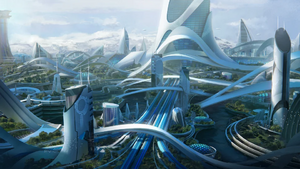More languages
More actions

Post-scarcity is a theoretical economic environment in which most goods can be produced in great abundance with minimal human labor needed, so that they become available to all very cheaply or even freely. Post-scarcity is one attribute of the highest stage of communism, as theorized in Marxism-Leninism. This state of affairs is theorized to be possible through the advancement of the productive forces of society via common ownership and rational economic planning.
Marx's writings[edit | edit source]
Karl Marx, in a section of his Grundrisse that came to be known as the "Fragment on Machines", argued that the transition to a post-capitalist society combined with advances in automation would allow for significant reductions in labor needed to produce necessary goods, eventually reaching a point where all people would have significant amounts of leisure time to pursue science, the arts, and creative activities; a state some commentators later labeled as "post-scarcity". Marx argued that capitalism—the dynamic of economic growth based on capital accumulation—depends on exploiting the surplus labor of workers, but a post-capitalist society would allow for:
The free development of individualities, and hence not the reduction of necessary labour time so as to posit surplus labour, but rather the general reduction of the necessary labour of society to a minimum, which then corresponds to the artistic, scientific etc. development of the individuals in the time set free, and with the means created, for all of them.
Marx's concept of a post-capitalist communist society involves the free distribution of goods made possible by the abundance provided by automation. The fully developed communist economic system is postulated to develop from a preceding socialist system. Marx held the view that socialism—a system based on social ownership of the means of production—would enable progress toward the development of fully developed communism by further advancing productive technology. Under socialism, with its increasing levels of automation, an increasing proportion of goods would be distributed freely.
Marx did not believe in the elimination of most physical labor through technological advancements alone in a capitalist society, because he believed capitalism contained within it certain tendencies which countered increasing automation and prevented it from developing beyond a limited point, so that manual industrial labor could not be eliminated until the overthrow of capitalism. Some commentators on Marx have argued that at the time he wrote the Grundrisse, he thought that the collapse of capitalism due to advancing automation was inevitable despite these counter-tendencies, but that by the time of his major work Capital: Critique of Political Economy he had abandoned this view, and came to believe that capitalism could continually renew itself unless overthrown.
People's Republic of China[edit | edit source]
In recent decades, China has emphasized economic growth and the unleashing of the productive forces to advance to a higher stage of society. This can be seen as an attempt to move towards a post-scarcity economy.
